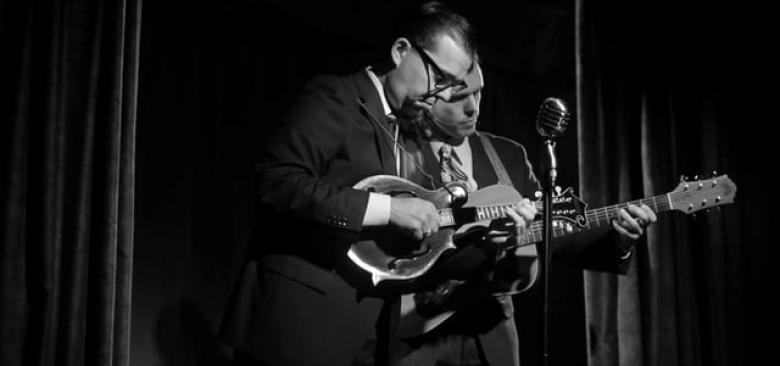Shot in stark black and white, La Muerte En La Alcarria places our two heroes (Spanish musicians Los Hermanos Cubero playing themselves) in the vast, endless plains that sleep underneath the infinite dome of a cloudless sky, in sleepy villages where not a soul walks about, and in a forest immersed in the pitch black night, where the spirits of the land roam. The landscape, at times, is so flat and barren that it borders on abstract. But where the silence seems absolute, some people hear music.
Shot in stark black and white, ‘La Muerte En La Alcarria‘ places our two heroes (Spanish musicians Los Hermanos Cubero playing themselves) in the vast, endless plains that sleep underneath the infinite dome of a cloudless sky, in sleepy villages where not a soul walks about, and in a forest immersed in the pitch black night, where the spirits of the land roam. The landscape, at times, is so flat and barren that it borders on abstract. But where the silence seems absolute, some people hear music.
In his first feature film, Fernando Pomares Piñol shows us a Castilla that, maybe not unlike the music it inspires, appears to be removed from time. Not entirely lost to the past, not completely contemporary, not a window into the future. Just there, in a way it always has been, in a way it always will be.
When their car stalls in the middle of the road the brothers abandon it, discard every book or piece of clothing they won’t need, sling the guitar and mandolin over their shoulder and walk away. Then they walk, walk, row a boat, and then, after walking a bit more, they walk some more, taking us through the beautiful Castilian landscape mentioned above. During all this walking, not a word is spoken between them. Their interaction is limited to small familiar gestures, such as nudging the other one’s arm to let him know there is some chorizo and bread available. They barely interact with anyone else either, since the only other characters in the film are not so much people, but more like ghosts from beyond, the spirits of Castilla itself – the maiden, the grandmother, the fox—who, when the brothers stare at them, stare right back.
Then they walk a bit more.
Between episodes of walking and spiritual encounters, though, there’s the music. And that’s what it’s all about. Throughout the film we are treated to live performances (with no audience, which gives for an eerie effect) of the duo’s fresh mix of traditional Spanish folk and American country/bluegrass, with Roberto on the mandolin, and Enrique Cubero on guitar and vocals. Their playlist consists of original numbers and interpretations of traditional Castilian folk songs. They range from fun, faster paced, tunes like “¿Es Usted De Castilla?”, and haunting slower pieces that sound like lamentations from a time long gone, to instrumental, Billy Monroe inspired, tracks where the mandolin is king. Songs from the earth.
Despite the beautiful scenery, though, more than a couple of times during the film’s 83 minutes runtime, I found myself getting restless, waiting for them to stop walking so that the next song could just start already!
One track that stands out is “La Molinera y El Corregidor”, a naughty piece of traditional storytelling, where the lyrics talk about how the town’s mayor sends this miller away so he can get it on with the miller’s wife. The miller, though, ain’t no fool and has a trick up his sleeve. While the music is playing, the story is illustrated by fun drawings on tiles, reminiscent of traditional tile paintings of the region, which inject the film with much needed variety and energy.
Despite the beautiful scenery, though, more than a couple of times during the film’s 83 minutes runtime, I found myself getting restless, waiting for them to stop walking so that the next song could just start already! And, while the music is indeed great fun, this is not entirely its merit.
Cleary inspired by old American westerns, and, perhaps more obviously, by the films of Jim Jarmusch, ‘La Muerte En La Alcarria’, according to Enrique Cubero is “the director’s intention to show an inner journey through [the Cubero Brothers] songs and the landscapes”. I just wish, that sometimes that journey wasn’t so “inner”, but a bit more extrovert.
‘La Muerte En La Alcarria‘ was screened at the Regent Street Cinema las 26th of September, as part of the Catalan Window of the London Spanish Film Festival

